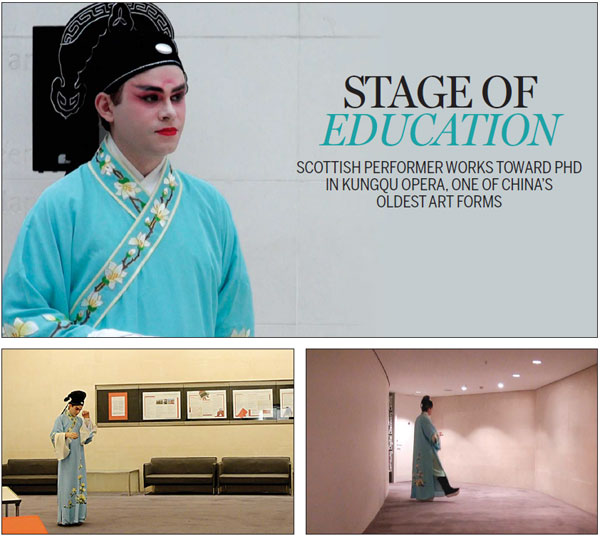Stage of education
(China Daily Europe)
Scottish performer works toward PhD in kungqu Opera, one of China's oldest art forms
Kim Hunter Gordon rarely misses the regular Saturday classes laid on by Jiangsu Kunqu Opera Troupe in their Nanjing rehearsal space.
With help from experienced actors, the 34-year-old Scotsman has been learning how to perform China's oldest existing form of opera for three years - and is even doing a PhD on the art form.
|
Kim Gordon performed kunqu at the British Museum in February. Photos provided to China Daily |
"Kunqu is a performance tradition that is as much about singing as European opera, as much about choreography as ballet, and as much about text as Shakespeare," says the drama and theater student of Royal Holloway, University of London.
When Gordon started attending classes, he was largely motivated by a desire to learn how the choreography of Kunqu opera has been passed down by generations and, sometimes, reinvented for audiences. But he soon discovered he enjoyed taking part, particularly the singing, which he now practices on a daily basis.
"The beauty of the lyrics comes to life when you sing them," the Inverness native says.
Kunqu opera was developed in Kunshan, now part of modern Jiangsu province, in the 16th century and remained popular until the mid-19th century, he says. As it was the basis of many other Chinese operas, it is often called "mother of the hundred theaters". In 2001, UNESCO listed the art form as one of the Masterpieces of the Oral and Intangible Heritage of Humanity.
After years of classes, Gordon can now play xiaosheng, young male characters, which is suited to his voice, according to his teacher, Qian Zhenrong, who has spent more than three decades on the stage.
"A xiaosheng usually sings with a huadan (a young female character) whose key is higher. So they must sing falsetto," he explains.
Yet while Gordon has no problems with his vocal ability, he is constrained when it comes to other aspects of the training.
Like ballerinas, Kunqu opera actors traditionally start training at a young age, to be able to make their movements graceful. As Gordon has started later in life, he finds it can be a struggle to maintain the correct body posture and movement throughout a performance.
The pronunciation of the script is also challenging, as the language used in Kunqu opera is derived from the common pronunciation during the Ming Dynasty (1368-1644) and is different from today's Mandarin.
"The tones are different to standard Chinese, which can make it difficult to recite," Gordon says. "But when it comes to singing, the music can help act as a guide."
Before he arrived in the country in 2006, Gordon, a former China correspondent for the Scotsman newspaper, says his knowledge of Chinese theater was limited to what he had seen in movies such as Farewell My Concubine, which tells the story of two Peking Opera actors.
He began to regularly watch Peking Opera shows, initially attracted by the "formal elements and conventions". Then, in 2009, a friend took him to see the Northern Kunqu Opera Troupe perform The Peony Pavilion in Beijing. He was hooked instantly, especially on the singing.
He explains that, while Peking Opera is full of energy with its fast percussion and jinghu fiddle, the bamboo flute and singing techniques featured in kunqu are more gentle. One word may stretch over four to 10 beats, and is accompanied with delicate movements to illustrate its meaning and to reveal the character's inner thoughts.
After that first performance, Gordon says he watched as much kunqu as possible, and eventually went in search of more, moving from Beijing to Shanghai and then Nanjing, where in 2011 he decided to make kunqu the focus of his PhD studies.
Practicing kunqu is like Chinese calligraphy, he says - it requires considerable patience and investment.
Gordon now splits his time between writing his thesis and honing his opera skills. He also works as translator at the Jiangsu troupe's Lanyuan Theater in Nanjing. He says his troupe is the one in China to provide English subtitles for all performances.
Last year, he also co-founded the University of London Chinese Opera Network to promote Kunqu opera in the UK, organizing classes, lectures and performances, including one at the British Museum in February. Gordon performed as the scholar Liu Mengmei in Picking Up the Portrait.
"I strongly believe that if people outside China are to appreciate kunqu, they must first see it is something that Chinese people like at the grassroots," he says.
The network has more than 40 members, about two-thirds of whom are Chinese students living in London.
"There's perhaps a tendency to assume old plays are difficult to understand or irrelevant today," he adds. "Yet the kunqu repertoire, like the best of Shakespeare, focuses on basic states of mind - ambition, loyalty, love, belief - in a way that makes it universal to any historical or cultural context."
Literati such as Tang Xianzu, Kong Shangren and Li Yu penned most of the classic Kunqu operas. As they were written in classical verse, the plays demand a high level of literacy to understand and appreciate.
In the late 18th century, kunqu gradually gave way to local operas that were more down-to-earth, but things have changed in recent years, as more young Chinese people, especially university students, are going to the theater.
The Jiangsu troupe has been holding a show every Saturday evening in Nanjing for more than a decade. Qian says that at first only half of the 130 seats inside Lanyuan Theater were being filled, but now extra seats have to be added when the play being performed is especially popular.
The troupe gives at least 20 to 30 performances a year at campuses in Nanjing and other cities across China. Some students have become regulars at Lanyuan, while some have started to attend the weekly classes as Gordon.
Launched in 2005, the classes allow amateurs and fans of all ages and backgrounds to learn from professionals.
"Kunqu's texts are graceful, which makes it a good fit for college students who are educated enough to understand it," Qian says. "Also, in the past decade, it has become fashionable to take in a kunqu show."
One of the driving forces behind this trend is Taiwan writer Bai Xianyong. In 2004, he collaborated with Suzhou Kunqu Opera Troupe to created a new version of The Peony Pavilion, blending the traditional with the modern, to cater to young people's tastes.
Although Bai's adaptation was controversial, Qian says he helped make going to watch kunqu into a social phenomenon.
lixueqing@chinadaily.com.cn
KUNSHAN IN MY EYE
- A novel venue to celebrate the art of Kunqu
Kunqu artist Zhang Jun racked up a new career achievement during his performance at the Modern Drama Valley festival at the Mercedes-Benz Arena on May 18, performing in a venue that is several times larger than what he is used to.
- US travel companies discover Suzhou
39 American travel professionals were given a two-day tour of the 2,500-year-old city from Sept 13 to 14, including visits to famous sights like Tiger Hill and Shantang Street, as well as chances to experience traditional Chinese art.



